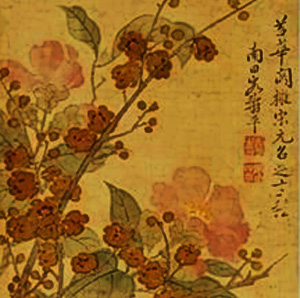Two months after her 24-year-old cousin died, the letter arrived. Written on Japanese rice paper, the two-page letter began, “Dear Katie,” switched into Japanese characters with a “Katie” sprinkled here and there until the bottom of the second page, where Katie found the first symbol she could translate—a smiley face with a big round nose. The letter ended, “So long. Love, Becca.”
The letter came in a standard business-size envelope with name and address typed, no return address, a Japanese stamp with a cancellation mark that Katie could not decipher. Both pages were six-inch squares with different borders. The first page had a purple border with pink plum blossoms. Standard Japanese motif. But the second page had an orange border with yellow dots and red carrots. Katie used to say, “Carrots are orange, not red. My hair is red!”
In the text, there were 14 sentences: 10 periods, 3 question marks, and an exclamation point.
Katie was about to call her mother but stopped. Her mother would immediately call her brother-in-law, and Rebecca’s Japanese father would translate it, but if Katie herself did it bit by bit, Rebecca could speak to her 14 more times. She could make Rebecca live 14 more years.
She decided to go to Ginza, the Japanese restaurant in the center of town. The old woman standing at the reception desk spoke terrible English. Katie could barely understand her. Perfect.
Katie showed her the letter. The woman’s eyes followed the text. She began to read it aloud. Katie had her repeat the first sentence six times before she understood it.
Send peanut butter.
Katie gestured for the woman to stop, handed her a twenty-dollar bill, and bowing, backed out the door.
A year later, Katie went back and did the same thing.
I am crazy with desire.
Katie got the letter framed in a plum-colored bamboo frame. Her family thought the letter was old news. They thought that everything that needed to be said had been said.
The next year when she went back, the restaurant was closed, replaced by a CVS. Katie thought, big deal. She did it once. She can do it again. She went to Sakura-Bana Japanese restaurant where she often ate lunch. The hostess was blond. Katie asked to speak to someone who could read Japanese and translate a letter for her. The hostess went back into the kitchen and brought out a small woman, wearing a filthy apron. Sweat creeped down her face and hairs escaped from her bun. She muttered in Japanese, and held out her hand for the letter. Katie gave her the framed pages.
The woman held the picture close to her face, then leaned her head back and began to read. Dear Katie, Send peanut butter. I am crazy with desire. Are you still in love with your boss? It’s been raining for a week.
Katie tried to grab the picture. The woman turned her body and kept reading. I am beginning to mildew. I hope it won’t be fatal.
Katie covered her ears and began to sing, Oh Lord, won’t you buy me a Mercedes Benz. When she finished the third verse, the woman had gone back into the kitchen and she had lost four years of Rebecca’s life.


